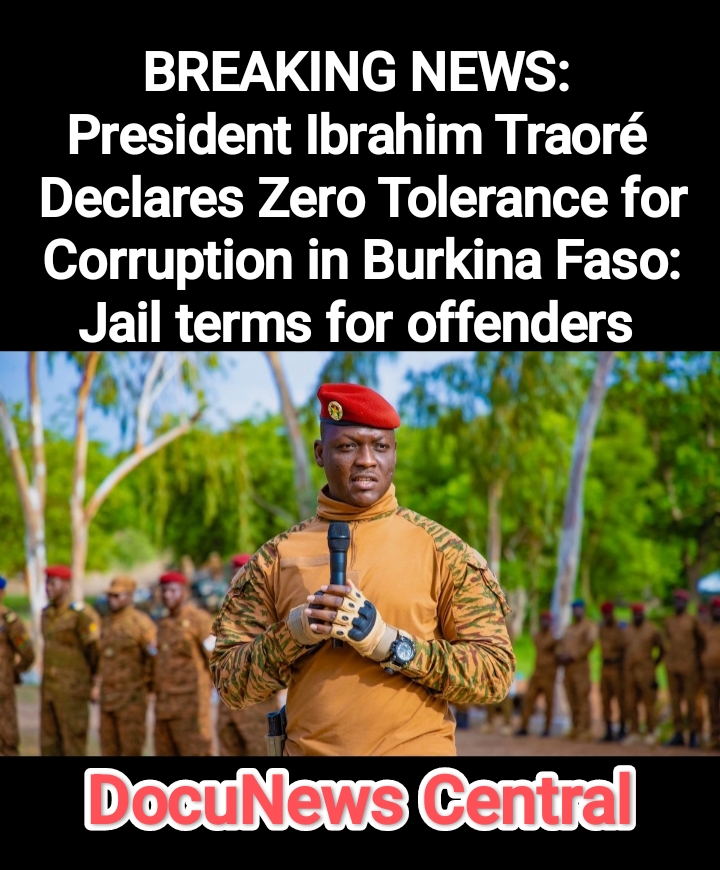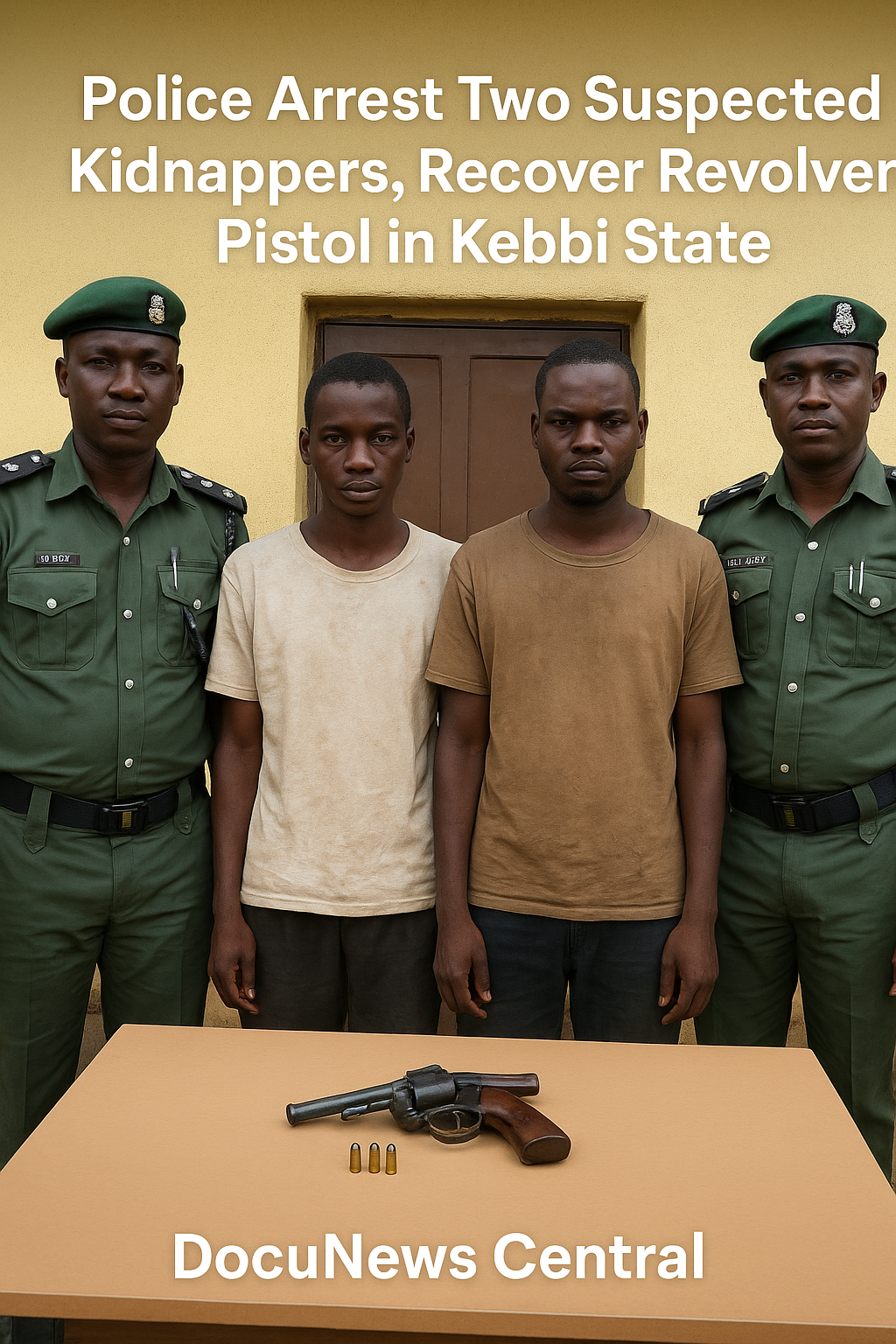

Ibrahim Traoré of Burkina Faso has issued a firm warning that any official caught in bribery or corruption will face immediate imprisonment. His commitment to transparency, discipline, and public service marks a new era of integrity and meritocracy in Burkina Faso. Read this full report by DocuNews Central.

Introduction: A Bold Stand Against Corruption in Burkina Faso
In a time when corruption has weakened institutions across several African nations, President Ibrahim Traoré of Burkina Faso is making a powerful statement. His recent declaration has sent shockwaves through both political and administrative circles. He announced that any government minister or official caught in bribery or corruption—no matter the amount involved—will face immediate imprisonment.
This is not just a warning. It is a bold move that demonstrates his determination to build a transparent, honest, and merit-based administration. Through this policy, President Traoré is setting an example that other nations may soon follow.
According to DocuNews Central’s analysis, Traoré’s latest announcement marks one of the most decisive anti-corruption stands ever taken by a West African leader in recent years.
President Ibrahim Traoré’s Clear Message to Public Officials
President Traoré’s message is unambiguous. He has emphasized that government salaries are meant to serve the public, not to enrich individuals in power. The purpose of holding a public office, he explained, is to deliver service and foster national development, not to accumulate wealth through illegal means.
His tone was firm and direct, leaving no room for misinterpretation. “If you’re in office to enrich yourself, you’re in the wrong place,” he reportedly said during a recent leadership briefing in Ouagadougou.
This statement underscores a leadership vision based on discipline, integrity, and accountability — values that Traoré believes are essential for Burkina Faso’s transformation.
Immediate Jail for Corrupt Officials — No Exceptions
President Traoré’s announcement was followed by an executive order outlining that anyone found guilty of bribery or corruption, regardless of rank or position, will face immediate imprisonment.
There will be no exceptions, no political immunity, and no favoritism. This means even top ministers are subject to the same punishment as junior officials if caught engaging in corrupt acts.
Such strict enforcement has made it clear that the president is serious about cleansing the system. In the words of one government insider quoted by TRT Afrika, “This administration is not about talk; it’s about results.”
Government Salaries: Meant for Service, Not Self-Enrichment
During his nationwide address, the president reminded civil servants that public funds are sacred. Government salaries and allowances are meant to enable effective public service, not to fund personal luxury.
He stressed that the misuse of public resources would not be tolerated. Officials found diverting funds for personal gain would be prosecuted immediately and removed from office without delay.
This clear separation between public duty and private interest has inspired confidence among ordinary citizens, who have long yearned for honest governance.
Public Exams Must Be Earned, Not Bought
In addition to cracking down on financial corruption, President Traoré also addressed the issue of academic and recruitment corruption. He stated firmly that public examinations must be earned, not purchased.
For too long, talented citizens have been denied fair opportunities because of bribery and favoritism in public recruitment. That era, according to the president, is over.
Every public exam, from civil service recruitment to military admissions, will now be monitored closely to ensure merit and fairness.
Every Thursday: Accountability Checks for All Government Officials
Perhaps one of the most innovative aspects of Traoré’s anti-corruption initiative is the introduction of weekly accountability inspections.
Every Thursday, government departments and ministries will undergo checks to assess how they are performing and whether funds are being used properly. These inspections are not symbolic; they are practical and results-driven.
According to Reuters, several African governments have expressed admiration for Traoré’s approach, calling it “a disciplined system of internal monitoring that could inspire regional reform.”
The New Face of Governance in Burkina Faso
President Ibrahim Traoré is not just enforcing laws; he is reshaping governance culture. His leadership embodies youthful energy combined with revolutionary discipline, reflecting the legacy of the late Thomas Sankara.
Traoré’s leadership style is participatory. He frequently meets with local administrators, youth groups, and the military to promote collaboration and ethical conduct.
Many analysts describe his governance as a “people-first model”—a form of leadership rooted in fairness, service, and national unity.
Public Reactions: Support for Traoré’s Transparency Drive
Across Burkina Faso, citizens have shown overwhelming support for the president’s anti-corruption drive. On social media, several users praised him for standing up for justice and morality.
A university lecturer in Ouagadougou told DocuNews Central that this move is “long overdue” and could “set a new ethical standard for West Africa.”
Why Anti-Corruption Measures Matter for Burkina Faso’s Future
Corruption undermines national development. It destroys trust, reduces investor confidence, and diverts funds meant for public welfare. By taking decisive action, President Traoré is not only punishing wrongdoers but also protecting the country’s future.
With these measures, Burkina Faso could see improved governance, better infrastructure, and stronger social systems in the coming years.
How Ibrahim Traoré’s Policy Aligns with African Reform Movements
Across Africa, a new wave of reformist leadership is emerging. Nations such as Tanzania, Rwanda, and Ghana have made significant progress in tackling corruption. Traoré’s actions align perfectly with this continental movement toward transparency and discipline.
According to Al Jazeera, Burkina Faso’s anti-corruption reform could position the country as a model for others to emulate.
Media Reports on Traoré’s Anti-Corruption Campaign
Several international outlets, including Reuters, TRT Afrika, and Al Jazeera, have highlighted President Ibrahim Traoré’s reforms as a significant step toward curbing corruption in West Africa.
The Road Ahead: Building Trust and Meritocracy in Burkina Faso
While the journey toward a corruption-free society is long, Traoré’s decisive measures are already setting the tone for what is possible. His leadership proves that accountability can be enforced when there is genuine political will.
Conclusion: A Promise of Integrity and Hope for the Nation
President Ibrahim Traoré’s anti-corruption declaration has positioned Burkina Faso on a path toward renewed trust, discipline, and national pride. His bold leadership and commitment to justice reflect a deep sense of patriotism that resonates with the people.
DocuNews Central will continue to monitor and report on the progress of this policy as it unfolds.
All Rights Reserved © 2025 DocuNews Central.
This article is protected by copyright and may not be reproduced without permission.








